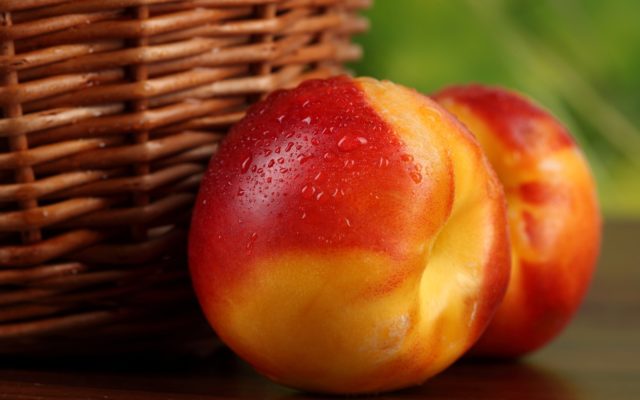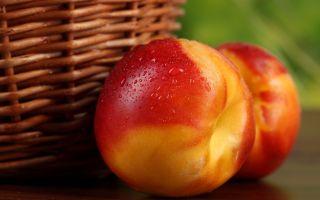Content
Nectarines during pregnancy are one of the reliable sources of nutrients for both the woman and her baby. They are distinguished by a juicy sweet taste, without a drop of bitterness and acidity. Many women use nectarines as a remedy to relieve symptoms of toxicosis.
Is nectarines possible during pregnancy
During pregnancy, women have to adjust their diet to exclude many of their favorite foods. All substances entering the body also get to the child. The ban does not apply to the consumption of nectarines during this period. It can be eaten safely by all women who are not allergic to the fruit.
Nectarine contains vegetable sugars. Due to this, it is possible to satisfy the need for sweets without harming the figure. In addition, substances in its composition normalize stool and help to cope with increased anxiety. The vitamin composition ensures the full development of the fetus at every stage of pregnancy.
Composition and value of nectarines
It is customary to call nectarines a variety of peach, the surface of which does not have villi. The hybrid has become widespread due to the fact that it is considered more resistant to environmental conditions.
The chemical composition of the product is represented by the following components:
- beta carotene;
- vitamins of groups A, K, PP, B and E;
- potassium;
- magnesium;
- phosphorus;
- manganese;
- zinc;
- vitamin C;
- iron;
- copper.

The calorie content of 100 g of the product is 44 kcal. This allows it to be included in the diet while losing weight. BZHU is presented in the following ratio:
- proteins - 1 g;
- fats - 6 g;
- carbohydrates - 9g.
What vitamins are in nectarine for pregnant women
The main benefit of nectarine for pregnant women is its rich vitamin composition. The content of folic acid is of particular importance. It does not accumulate in the body, so its reserves must be replenished regularly. Drinking nectarine helps to satisfy this need. Folic acid contributes to the proper development of the nervous system.
The presence of ascorbic acid in the composition of the fruit is also important. It supports the immune system. Vitamin K, in turn, is involved in the formation of the circulatory system. And vitamin PP prevents the development of diabetes and reduces the risk of thrombosis.
Why is nectarine useful for pregnant women?
Eating the medicinal fruit is beneficial in every trimester of pregnancy. The abundance of vitamins in its composition makes a woman more energetic and improves her mood. Together, this prevents a number of serious problems. Minerals are involved in building bones, cardiovascular system, nerve cells, etc.Among other things, nectarine simply satisfies the gourmand needs that often arise during pregnancy.
In the 1st trimester
The substances that make up nectarines are especially important during the 1st trimester of pregnancy. During this period, the laying of the main organs of the child takes place. To prevent possible pathologies, it is necessary that a sufficient amount of nutrients enter the woman's body. Vitamin B9 is responsible for the formation of the nervous system. Calcium and magnesium are involved in building the musculoskeletal system. Iron ensures the proper development of the circulatory system.
In the 2nd trimester
In the 2nd trimester, a woman may face indigestion. This is due to the pressure exerted by the fetus on the organs. Due to its fiber content, nectarine helps to cope with this problem. In addition, its use helps to reduce blood pressure, which is also relevant during this period.
In the 3rd trimester
In the last months of pregnancy, the female body prepares for the upcoming birth. During this period, he especially needs nutrition with vitamins. A strong immune system will be able to withstand colds and viral diseases.
How to eat nectarines for pregnant women
Like other fruits, the peach hybrid is recommended to be eaten in the morning. In this case, it will be absorbed faster. Before use during pregnancy, the fruit should be thoroughly rinsed with running water. For convenience, you can divide it into pieces. The bone must be thrown away. It contains substances that have a toxic effect on the human body.

Selection rules
When buying fruits, you should pay attention to their appearance. The surface must be flat and free from damage. Ripeness is indicated by the reddish hue of the peel. A characteristic smell may come from it. When pressed, a dent forms on the surface of the fruit. It is advisable to buy nectarines in season, at specialized markets. This will make them less likely to contain preservatives and other chemicals.
What nectarines can be used during pregnancy
During pregnancy, nectarines can be eaten in any form. But it is better to give preference to fresh fruit. They contain more nutrients, since they are not processed in production.
How many nectarines can you eat per day
It is recommended to eat no more than 4 fruits daily. Vitamin overload is as much a health hazard as vitamin deficiency. The juice is taken in ½ cup, after diluting it with water in the same ratio. It is important not to drink it on an empty stomach.
Storage rules
It is customary to store nectarines in the lower compartment of the refrigerator. If the fruits are not ripe enough, they can be left on the windowsill for a couple of days. This will contribute to their early ripening. It is advisable to drink nectarine juice immediately after preparation. In dried and canned form, the fruit can be stored for more than 1 year.
Limitations and contraindications
Nectarines are not as safe as they might seem at first glance. If consumed in excessive amounts, you can experience stool disorder. In addition, the fruit has a diuretic effect. During pregnancy, this deficiency can bring significant discomfort.
Contraindications for nectarine include:
- allergic reaction;
- diabetes;
- endocrine disorders.
During pregnancy, allergy to the product can manifest itself in the form of a skin rash and lacrimation. Antihistamines quickly stop symptoms. But before using them, you should consult with a specialist.
Conclusion
Nectarines during pregnancy can be both beneficial and harmful. It all depends on the amount in which they are consumed. With a moderate approach, the fruit will only have a positive effect on the health of the woman and her child.

